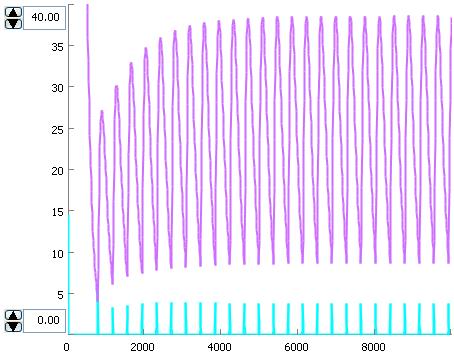Imperial College 2006
From 2006.igem.org
(→Progress) |
(→Progress) |
||
| Line 2: | Line 2: | ||
== Progress == | == Progress == | ||
| - | + | [[image:Oscilator3.jpg|right|frame|Successful oscilator modelling]] | |
===Oscillator based on Predator Prey dynamics=== | ===Oscillator based on Predator Prey dynamics=== | ||
We are creating a molecular system which is able to show oscillations which can be described by the lotka-volatra equations. The molecular oscillations are powered by two distinct cell populations, one which drives the predator and a second driving the prey. '''This flexible design will allow us to alter the amplitude and wavelength''' of the oscillator by changing the relative population sizes. The system uses quorum sensing to create culture wide synchronised oscillations of N-acyl homoserine lactone. The system is working in models using realistic values and we are currently devising ways to test the bio-bricks to analyse how their performance affects our models. '''Looks very promising…''' | We are creating a molecular system which is able to show oscillations which can be described by the lotka-volatra equations. The molecular oscillations are powered by two distinct cell populations, one which drives the predator and a second driving the prey. '''This flexible design will allow us to alter the amplitude and wavelength''' of the oscillator by changing the relative population sizes. The system uses quorum sensing to create culture wide synchronised oscillations of N-acyl homoserine lactone. The system is working in models using realistic values and we are currently devising ways to test the bio-bricks to analyse how their performance affects our models. '''Looks very promising…''' | ||
| + | |||
| + | |||
| + | |||
| + | |||
| + | |||
| + | |||
| + | |||
| + | |||
| + | |||
===BioClock=== | ===BioClock=== | ||
| + | |||
| + | We are also working on a BioClock. The clock utilises predictable pulse transmission through cells in order to generate a 24 hour clock. From our designs it will be possible to tell the time at any time of the day with good accuracy. Our design alows for easy modulation of the time period involved, allowing us to potentially generate clocks that can measure a week, month or even year. This leads to the possibility of engineering a BioCalender. | ||
== Team Members == | == Team Members == | ||
Revision as of 17:12, 13 July 2006
Contents |
Welcome to Imperial College iGEM team!
Progress
Oscillator based on Predator Prey dynamics
We are creating a molecular system which is able to show oscillations which can be described by the lotka-volatra equations. The molecular oscillations are powered by two distinct cell populations, one which drives the predator and a second driving the prey. This flexible design will allow us to alter the amplitude and wavelength of the oscillator by changing the relative population sizes. The system uses quorum sensing to create culture wide synchronised oscillations of N-acyl homoserine lactone. The system is working in models using realistic values and we are currently devising ways to test the bio-bricks to analyse how their performance affects our models. Looks very promising…
BioClock
We are also working on a BioClock. The clock utilises predictable pulse transmission through cells in order to generate a 24 hour clock. From our designs it will be possible to tell the time at any time of the day with good accuracy. Our design alows for easy modulation of the time period involved, allowing us to potentially generate clocks that can measure a week, month or even year. This leads to the possibility of engineering a BioCalender.
Team Members
- Christin Sander
- Deepti Aswani
- Farah Vohra
- Jiongjun Bai
- John Sy
- John Chattaway
- Jonathan Wells
- Tom Hinson
Instructors
- Prof. Richard Kitney
- Prof. Paul Freemont
- Dr. David Mann
- Vincent Rouilly
- Chueh-Loo Poh
Schedule
Start Date: 3 July 2006
We have just finished forming the team. Now it is the examination period. Soon after that we will have a more detailed planning schedule.
Link to Imperial College Wiki
[http://155.198.83.35/igemwiki2006/mediawiki-1.6.6/index.php/Main_Page Imperial College Wiki] - You must be logged into the college network via a campus computer or vpn to access this site.
